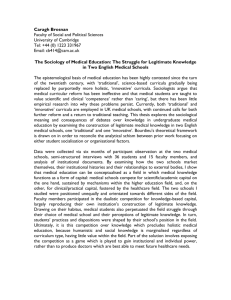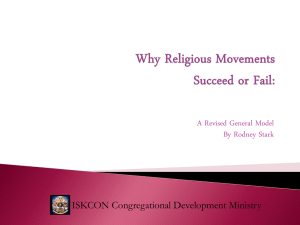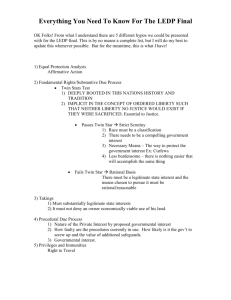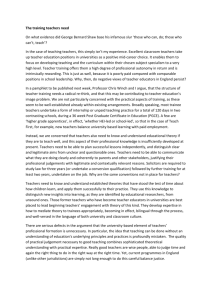Legitimate Expectations Revisited
advertisement
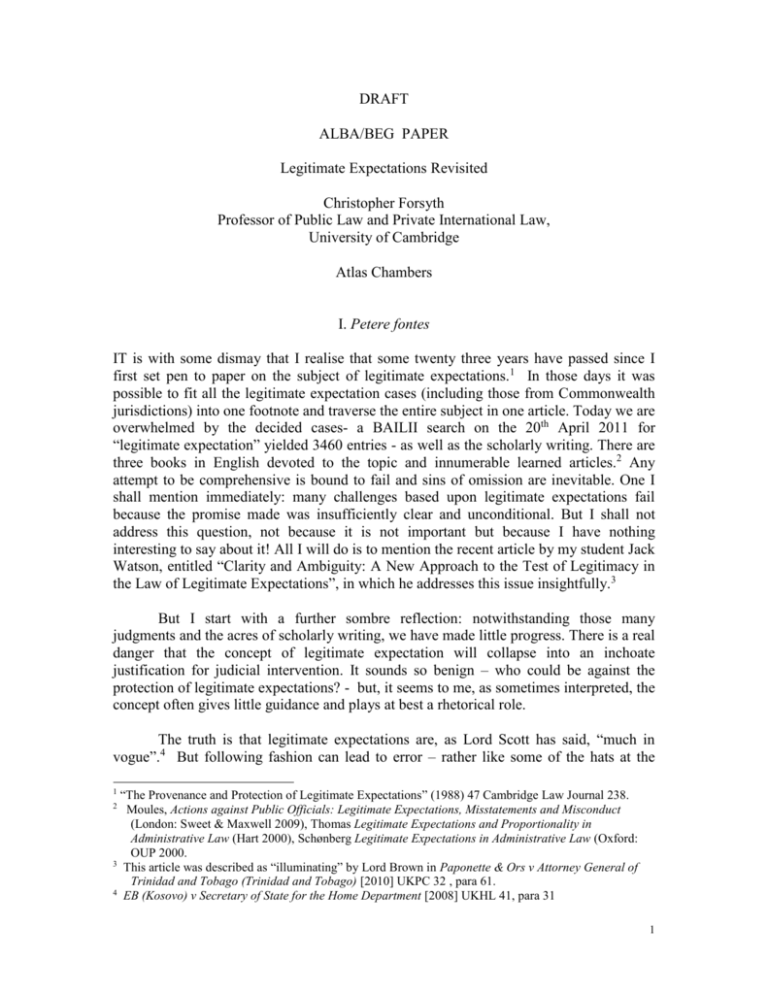
DRAFT
ALBA/BEG PAPER
Legitimate Expectations Revisited
Christopher Forsyth
Professor of Public Law and Private International Law,
University of Cambridge
Atlas Chambers
I. Petere fontes
IT is with some dismay that I realise that some twenty three years have passed since I
first set pen to paper on the subject of legitimate expectations.1 In those days it was
possible to fit all the legitimate expectation cases (including those from Commonwealth
jurisdictions) into one footnote and traverse the entire subject in one article. Today we are
overwhelmed by the decided cases- a BAILII search on the 20th April 2011 for
“legitimate expectation” yielded 3460 entries - as well as the scholarly writing. There are
three books in English devoted to the topic and innumerable learned articles.2 Any
attempt to be comprehensive is bound to fail and sins of omission are inevitable. One I
shall mention immediately: many challenges based upon legitimate expectations fail
because the promise made was insufficiently clear and unconditional. But I shall not
address this question, not because it is not important but because I have nothing
interesting to say about it! All I will do is to mention the recent article by my student Jack
Watson, entitled “Clarity and Ambiguity: A New Approach to the Test of Legitimacy in
the Law of Legitimate Expectations”, in which he addresses this issue insightfully.3
But I start with a further sombre reflection: notwithstanding those many
judgments and the acres of scholarly writing, we have made little progress. There is a real
danger that the concept of legitimate expectation will collapse into an inchoate
justification for judicial intervention. It sounds so benign – who could be against the
protection of legitimate expectations? - but, it seems to me, as sometimes interpreted, the
concept often gives little guidance and plays at best a rhetorical role.
The truth is that legitimate expectations are, as Lord Scott has said, “much in
vogue”.4 But following fashion can lead to error – rather like some of the hats at the
“The Provenance and Protection of Legitimate Expectations” (1988) 47 Cambridge Law Journal 238.
Moules, Actions against Public Officials: Legitimate Expectations, Misstatements and Misconduct
(London: Sweet & Maxwell 2009), Thomas Legitimate Expectations and Proportionality in
Administrative Law (Hart 2000), Schønberg Legitimate Expectations in Administrative Law (Oxford:
OUP 2000.
3
This article was described as “illuminating” by Lord Brown in Paponette & Ors v Attorney General of
Trinidad and Tobago (Trinidad and Tobago) [2010] UKPC 32 , para 61.
4
EB (Kosovo) v Secretary of State for the Home Department [2008] UKHL 41, para 31
1
2
1
Royal Wedding – and this should be avoided. The point is that unless the concept is clear
it will be unable to do any of the hard work of deciding whether judicial intervention is
apt in any particular case. Another student of mine, Paul Reynolds, in his recent Public
Law article entitled “Legitimate Expectations and the Protection of Trust in Public
Officials” has spoken of the concept being applied “in entirely inappropriate cases,
thrown in alongside a soup of other heads of review”.
Given this, it seems to me, the time has come to return to fundamentals. So we
should ask fundamental questions about the justification and the task of the concept of
legitimate expectations. That consideration of these fundamental issues leads me to
conclude that legitimate expectations will end up with a narrower but still vital role.
II. Vertrauenschutz
The first fundamental question I ask is why it is that the law protects legitimate
expectations. I argue (as I did in my first article in 1988) that the justification for the
protection of legitimate expectations is the simple idea that the law should protect the
trust that has been reposed in the promise made by an official. Good government depends
upon trust between the governed and the governor. Unless that trust is sustained and
protected officials will not be believed and individuals will not order their affairs on that
assumption. “Government becomes a choice between chaos and coercion.”
The value of trust to good government seems obvious at the general level.
Baroness O”Neill in her 2002 Reith Lectures5 citing the Analects of Confucius tells that
how “Confucius told his disciple Tze-Kung that three things are needed for government:
weapons, food and trust. If a ruler can”t hold on to all three, he should give up the
weapons first and the food next. Trust should be guarded to the end: without trust we
cannot stand.” All of this deals with trust in general and its value seems to be relatively
uncontested. But we are concerned with the protection of trust in the context of specific
administrative decisions, i.e. the doctrine of legitimate expectations is concerned with the
trust that the individual reposes in a decision-maker6 not with a generalised trust reposed
in government as a whole - which is obviously subject to the vagaries of politics.
Perhaps this is the moment to bring in Lord Denning. In my 1988 article I
suggested that the German concept of Vertrauenschutz – the protection of trust (which
seems to deal primarily with the specific protection of trust) - had played a part in the
development legitimate expectations in English law and that this was an example of cross
fertilisation of concepts from one legal system to another. So I made the mistake of
writing to Lord Denning and asking whether Vertrauenschutz might have been some such
influence on his judgment in Schmidt v. Secretary of State for Home Affairs7 in which, for
the first time, legitimate expectations were introduced into English law….and without
any citation of authority. He responded immediately to say that he felt ‘sure the idea
5
A Question of Trust (CUP, 2002), p. 3
As is very clearly pointed out by Reynolds.
7
[1969]2 Ch 149.
6
2
came out of my own head and not from any continental or other source." So the origin of
the concept as far as English law is concerned lies within Lord Denning’s justly famed
creative mind and not elsewhere! This does not mean that trust is excluded as a
justification but it was an unpromising start!
Moreover, when one looks at the jurisprudence and asks why the law protects
legitimate expectations one gets several answers and these do not include the protection
of trust, The protection of legitimate expectations is often considered to be required by
fairness.8 The advancement of “good administration” is championed by Lord Justice
Laws.9 The abuse of power has been considered the “root concept” justifying the
protection of legitimate expectations.10 And there is also a tendency to create a melange
of several of these justifications. It is commonplace for a judge to ask whether the
dashing of a legitimate expectation was ‘so unfair as to amount to an abuse of power.”11
The trouble with all these overarching and traditional justifications is not that they
are wrong but that they are unhelpful. Lord Justice Laws has remarked in this context
that: “Abuse of power ….catches the moral impetus of the rule of law…..But it goes no
distance to tell you, case by case, what is lawful and what is not.”12 The same remark
could be made about fairness or for that matter the valuable but imprecise concept of
“good administration”. Moreover, putting the focus back onto the “root concept” or an
amalgam of such concepts leaves the legitimate expectations redundant. For instance,
Lord Brown has recently said in the Privy Council in a case (Paponette) in which
legitimate expectations were much argued that all he needed to do was to address the
composite question: “was the imposition of reasonable charges here so unfair as to
amount to an abuse of power?”13 Here it is plain that the concept of legitimate
expectations is playing no useful role at all in identifying whether the court should
intervene or not.
But it is a simple concrete question of fact whether trust has been reposed in an
official’s promise, so this principle does go ‘some distance” to indicate what is lawful
and what is not. It captures precisely why legitimate expectations should be protected.
Thus it seems to me that the protection of trust in the promises or presentations of the
8
See, for instance, R v. Inland Revenue Commissioners, ex p MFK Underwriting [1990] 1 WLR 1545, at
1569H-1570A (Bingham LJ); CCSU v. Minister of Civil Servants [1985] AC 374 at 415C-G (Lord
Roskill).
9
Particularly in Abdi v. Secretary of State for the Home Department [2005] EWCA Civ 1363.
10
The phrase comes from R. v. Secretary of State for Education, ex p. Begbie [2000] 1 WLR 1115 (CA),
1129 (Laws LJ). Abuse of power is also much relied upon in R. v. North and East Devon Health
Authority ex p. Coughlan, [2000] 2 WLR 622 (“a distinct application of the concept of abuse of
power”).
11
Coughlan [78] per Lord Woolf MR. In R (Bancoult) v Secretary of State for Foreign and
Commonwealth Affairs (No 2) [2008] UKHL 61 at [135]. Lord Carswell said that “The basis of the
jurisdiction [to protect legitimate expectations] is abuse of power and unfairness to the citizen on the part
of a public authority.”
12
13
Abdi v. Secretary of State for the Home Department [2005] EWCA Civ 1363, para. 67.
Paponette & Ors v Attorney General of Trinidad and Tobago (Trinidad and Tobago) [2010] UKPC 32 ,
para 61
3
official is much to be preferred to that reliance on overarching but rather inchoate
justifications. It is not, of course, the whole answer but it is a good starting point.
There are some signs that judicial attention is being paid to trust. Bokhary P.J. in
the Hong Kong Court of Final Appeal concluded that the protection of legitimate
expectations “facilitates the task of governance” because “people feel able to put their
faith in what their government says and does”.14 In the Supreme Court of India there has
been approval of the concept of Vertrauenschutz and thus the conclusion was reached
that “the existence of a legitimate expectation may even in the absence of a right of
private law, justify its recognition in public law”.15 And in the Northern Irish High Court
McCloskey J has approved the words I used earlier: "Good government depends upon
trust between the governed and the governor. Unless that trust is sustained and protected
officials will not be believed and the government becomes a choice between chaos and
coercion".16 In the ECJ there has been recognition by Advocate General Trabucchi that
trust, as protected by legitimate expectations, is “one of the superior rules of the
Community legal order for the protection of individuals”.17
III. Legal certainty and Vertrauenschutz
Particularly in the European context “legal certainty”, i.e. the idea that “the
individual ought to be able to plan his or her action on the basis [that the expectation will
be fulfilled]”18 is also relied upon to justify the protection of legitimate expectations.
Indeed, I wrote about “legal certainty” playing this kind of role in my 1988 article and
more recently. But Paul Reynolds has persuaded me otherwise. He writes that:
“It is natural that there should be a clear distinction between the principles of
legal certainty and legitimate expectations in European law. Both concepts
originate from German Law19 and within German law they are perfectly
separate.20 Legal certainty is based on Rechtsscherheit: a principle which
demands certainty of the content of law and is primarily employed in cases
concerning retroactive law. The protection of legitimate expectations is
derived from the principle of Vertrauensschutz21, which seeks to ensure that
“everyone who trusts the legality of a public administrative decision should
be protected”.22 The principle of Vertrauensschutz seeks quite distinct
objectives to legal certainty. It is concerned to promote confidence in the
public administration and trust in its decisions: this is seen from the fact that
14
Ng Siu Tung v Director of Immigration, [2002] 1 HKLRD 561 at [349] admittedly dissenting.
Official Liquidator v Dayanand CIVIL APPEAL NO.2985 OF 2007, Singhvi J, para 78.
16
Board of Governors of Loreto Grammar School, Re Judicial Review [2011] NIQB 30
17
Deuka and others v Einfuhr- und Vorratsstelle [1975] ECR 759, 777.[not checked taken from Reynolds].
18
Craig Administrative Law (6th ed, 2008), para 20-004.
19
Thomas (2000) p. 42.
20
See R. Errerra, “Legitimate expectation – Principle of Law to be Applied Only in Relation to the
Implementation of EC Law - Legal Certainty” (2006) 11 PL 858 and Schwarze p. 938 et seq.
21
M. Schroeder, “Administrative Law in Germany” in Seerden and Stroink (eds) Administrative Law of the
European Union (London 2005) p.119.
22
Ibid.
15
4
the principle can apply even against legislation, the surest challenge to legal
certainty that there can be.23
The European Court has explicitly stated24 that the principle of
Vertrauensshutz shaped legitimate expectations, so it is initially surprising
that legal certainty has achieved such status in this area. The prominence of
legal certainty (at the neglect of a trust-based understanding of legitimate
expectations) is probably best explained by political considerations specific to
the ECJ. The legal systems of the six founding members of the EC all
endorsed the principle of legal certainty. However, France in particular was
(and is) highly cautious and wary about the potential of the doctrine of
legitimate expectations disturbing stability.25 … Rather than following the
ECJ’s unfortunate conceptualisation of the doctrine, the English courts should
enjoy their relative freedom to allow it to fulfil its proper role: the promotion
of fairness and non-abuse through the protection of trust.”
IV. Scientia
But if the protection of trust is our starting point there are certain consequences.
The individual to whom a promise is made, reposes trust in that promise, and
consequently expects the promises to be fulfilled. Whether that expectation exists is, selfevidently, a question of fact. If the individual did not expect anything, then there is
nothing that the doctrine can protect. So a person unaware of an undertaking made by a
public authority to behave in a particular way cannot expect compliance with that
undertaking and there is no legitimate expectation to protect. For long this was
considered obvious and unexceptional.26 After all where no trust has been reposed in the
promise or undertaking of the official there is no reason why any subsequently
discovered “expectation” should be protected.
But the Court of Appeal has disagreed in a leading case (Rashid).27 Here the
Home Office had refused an Iraqi Kurd’s application for asylum on the ground that he
might safely relocate to the Kurdish Autonomous Zone. In so deciding, the policy of not
G. Nolte “General principles of German and European administrative law - a comparison in historical
perspective” (1994) 57 MLR 191.
24
Westzucker v Einfuhr [1973] ECR 723, 729
25
Schwarze, p. 869.
26 R. v. Secretary of State for National Heritage ex p. J Paul Getty Trust, [1997] EU LR 407 (statement of
which Trust was unaware could not found legitimate expectation) and Chundawara v. Immigration Appeal
Tribunal [1988] Imm. AR 161 (unincorporated but ratified treaty of which claimant unaware could not
found legitimate expectation). Cf. majority judgment in Minister of Ethnic Affairs v. Teoh (1995) 128 ALR
353 (“It is not necessary that a person seeking to set up such a legitimate expectation should be aware of
the Convention [upon which the expectation was founded] or should personally entertain the expectation”;
at 365, contra however McHugh J at 383). See (1996) 112 LQR 50 (M. Taggart). And see R. v. Home
Secretary ex p. Hindley [2000] 2 WLR 730 at 737 (mandatory life prisoner had no expectation that Home
Secretary would not impose a “whole life” tariff, since she was unaware of the provisional decision to that
effect).
23
27
R(Rashid) v. Home Secretary [2005] EWCA Civ 744.Discussed [2005] JR 281 (Elliott).
5
relying on internal relocation in such cases (of which the Kurd was quite unaware) was
inadvertently overlooked. This was found to be “conspicuous unfairness amounting to an
abuse of power” and the challenge succeeded.28 But Pill LJ also said: “there plainly is a
legitimate expectation in a claimant for asylum that the Secretary of State will apply his
policy on asylum to the claim. Whether the claimant knows of the policy is not in the
present context relevant. It would be grossly unfair if the court’s ability to intervene
depended at all upon whether the particular claimant had or had not heard of a policy,
especially one unknown to relevant Home Office officials.”29
But to bring such “no expectation” cases under the rubric “legitimate expectation”
is to deprive that concept of clear meaning. Thus if no trust has been reposed the concept
has nothing to add to an inquiry into what fairness requires in the circumstances or
whether the power concerned has been abused. As Reynolds has remarked: “This
concocted legitimate expectation expands the doctrine’s boundaries to the point where it
simply collapses into an unrestricted principle of fairness; the doctrine ceases to add
anything in its own right – it is “[denuded]…of any utility”.30
V Policy
But why should the curious individual who read in the newspaper (or on a
department al web-site) about a favourable policy have their expectation of the benefits
of that policy applying to them, protected, while another individual in exactly the same
position expect that he or she, being less curious and lively, does not read the newspaper
(or web-site) and so does not know of the policy? Surely both these individuals should be
treated in the same way? There has to be an adequate answer consistent with the trust
based approach to expectations to this and similar questions.
Is the answer not the following? Elementarily (and without any reliance upon any idea of
legitimate expectation) the policies adopted by a decision-maker have to be consistently
applied. “The principle that policy must be consistently applied”, said Lord Dyson
recently in the Supreme Court, “is not in doubt”.31 And I would add this has been well
established for many years.
This does not depend upon any knowledge of the policy by the individual. Nor does it
depend upon any publication of the policy. It is simply inherent in the idea of a policy as
a guide to decision-making that it should be used as a guide .... with the decision-maker,
of course, being free to depart from the policy for good reason. Thus policies have to be
consistently applied.
28
para. 54(Dyson LJ) and see also para. 34 (Pill LJ). A declaration that the claimant was entitled to
indefinite leave to remain was made.
29
Para 25.
30
Steele ‘substantive Legitimate Expectations: Striking the Right Balance?” (2005) 121 LQR 300, 309,
n.43.
31
Para 26.
6
None of this depends upon the concept of legitimate expectations at all. It is true
that an individual who knows of the policy and reposes trust in it may expect that it will
be applied to him or her. But since the same protection will be available to them under
the principle just discussed, the concept of legitimate expectation has added nothing in
these circumstances and is redundant in this context.
Consider the recent Supreme Court decision of Lumba and Mighty v Home
Secretary.32 The case concerned the detention of foreign national prisoners under
Schedule 3 of the Immigration Act 1971 pending their deportation. The Home Secretary
had a long established and published policy that amounted to a presumption in favour of
release pending deportation save in specified circumstances. However, for a period (April
2006-September 2008) the Home Secretary maintained and operated a secret or
unpublished policy which imposed “a near blanket ban” on release of foreign national
prisoners recommended for deportation. There seems not to have been malice in the
secret policy just “muddle galore”.33 This will not have surprised seasoned observers of
the Home Office.
Unsurprisingly, Lord Dyson giving the lead judgment found that the Home
Secretary “unlawfully exercised the statutory power to detain [the appellants] pending
deportation because she applied an unpublished policy which was inconsistent with her
published policy.”34 Now Lord Dyson does not rely upon legitimate expectations at all in
reaching this conclusion.35 And it is plain that it was unnecessary to do so. There was a
compelling strong case for the consistent application of the published policy in these
circumstances. Given that the liberty of the subject was engaged the consistent
application of the policies applicable was essential to ensure that people were not
arbitrarily detained.
But legitimate expectations that a policy be applied do feature prominently in
Lord Phillips’s leading dissent. So one expects to find in Lord Phillips’s judgment some
clue to what greater insight the concept of legitimate expectation brings to these facts.
But in fact it seems to me that there is little to be gained. The learned judge recognises
that there is an overlap between “the question of the nature and effect of a legitimate
expectation” and the “effect of a decision to take action that falls within a power
conferred by statute but which conflicts with a published policy as to the manner in
which that power will be exercised”.36 But nothing turns on this. The doctrine of
legitimate expectations does not assist in the analysis at all.
Now few foreign national prisoners are au fait with the nuances of the Home
Secretary’s policy of release pending deportation and clearly they could have no
knowledge of the secret policy. So the significant point of difference between the
consideration of the consistent application and the protection of a legitimate expectation,
viz., the applicant’s knowledge of the promise, did not arise. There was simply no
32
[2011] UKSC 12.
Paar 318 Lord Phillips.
34
Para [169].
35
There is only one, en passant, mention of legitimate expectations in his judgment (para 69).
36
Para 303.
33
7
legitimate expectation here. So all the time and effort and money spend arguing over
legitimate expectations in the Lumba litigation was wasted.
So the concept of legitimate expectations brings nothing to the determination of
whether a policy has been consistently applied or not. Of course, if a specific promise has
been made to an individual that a particular policy will or will not be applied to a
particular circumstances the law of legitimate expectations will protect the trust placed in
that promise. This would be though not on the application of the policy but upon the
decision whether in the particular case the policy should be applied or not. But such
situations aside the overlap between legitimate expectations and the consistent
application of policy is best ignored. This conclusion contradicts the several prominent
cases discussing at great length how legitimate expectations that policies will be applied
are protected. But perhaps Lord Dyson’s avoidance of legitimate expectations in Lumba
points the way to the future in this kind of case.
VI Classic administrative law
I turn now to my second fundamental principle: that classic administrative law
applies to legitimate expectations as it does to other questions. So, for instance, since
Parliament is supreme, a legitimate expectation cannot stand against a statute. The ultra
vires expectation, for instance, cannot be protected (although it may be an element in a
tort remedy or human rights claim or an Ombudsman’s award). There can be no
balancing of the protection of trust against the principal of legality. This is relatively
uncontroversial.37
But the point of classic administrative law at which I would pause is – the no
fetter principle – viz., that the decision-maker entrusted with a power by law must remain
free to exercise that power as he or she judges the public interest requires. Thus unless
there is statutory warrant that power may not be fettered. This too is straightforward and
uncontroversial but the logic of this classic administrative law principle has seldom been
followed through in the context of legitimate expectations. So let us turn to that task
starting with the easy propositions.
Where one is dealing with an expectation that a particular procedure is to be
adopted there is little difficulty in most statutory contexts in concluding that the trust
reposed in that promise is protected by requiring, for a valid decision, that the promised
procedure be followed. The person affected is not entitled to a favourable decision but the
trust which he has reposed in the decision-maker’s undertaking should be protected. The
requirement of a fair procedure in such circumstances should not surprise. The decisionmaker must clearly make a proper decision before dashing the expectation; and
elementarily, that requires procedural fairness. But no question of any fettering of
discretion arises. There is no doctrinal difficulty.
37
Rowland v. Environment Agency, [2003] EWCA Civ 1885, para 102 , “….English domestic law does not
allow the individual to retain the benefit which is the subject of the legitimate expectation, however
strong, if creating or maintaining that benefit is beyond the power of that public body”.
8
But when one is dealing with a substantive expectation, i.e. one where some boon
or benefit is expected as the outcome to the decision making process, different
considerations arises. But even here it is often possible to protect such expectations
adequately in non-controversial ways. For instance, in most statutory contexts there is
little difficult in concluding that the substantive legitimate expectation should be
protected by requiring it to be treated as a relevant consideration to be taken properly into
account by the decision-maker in making their decision. The decision-maker deciding to
dash a substantive expectation must, again on elementary principles, take into account all
relevant considerations. One clear relevant consideration will be the existence of the
legitimate expectation.38 There are several examples of this in the decided cases. 39 The
court in these cases does not order the expectation to be fulfilled but it had to be properly
taken into account. Such protection is unexceptional. But no question of any fettering of
discretion arises. There is no doctrinal difficulty.
Similarly, it may be that the expectation may be adequately protected by granting
a hearing. And Schmidt v. Secretary of State for Home Affairs40 is the paradigm example
of this. There Lord Denning said obiter that an alien who had been given leave to enter
the United Kingdom for a limited period had a "legitimate expectation of being allowed
to stay for the permitted time" and, hence, if that permission was "revoked before the
time limit expires, [the alien] ought to be given an opportunity of making representations
[to the Home Secretary]". But no question of any fettering of discretion arises. There is
no doctrinal difficulty.
VII The prism of private law
The crucial and difficult question is whether there are cases in which the court should
take the further step of requiring the substantive protection of the substantive expectation.
And we all know that they have in certain circumstances taken that further step. They
have required the fulfilment of the expectation unless an overriding public interest
ordains otherwise. I would like to acknowledge here the benefit I have gained from the
analysis of Tom Pascoe in his unpublished essay: “Substantive legitimate expectations
and private law estoppel: we meet again?”
In the leading case (Coughlan) a health authority which, for practical and
financial reasons, wished to close a specially built home for very seriously injured longterm patients, in breach of its promise to the residents that it was their “home for life”,
38
See Moules, as above, para.1.106.
39 R. (Bibi) v. Newham LBC [2002] 1 WLR 237 (CA). And see R (ABCIFER) v. Secretary of State for
Defence [2003] EWCA Civ 473; [2003] QB 1397, paras 74-75.
40
[1969]2 Ch 149.
9
was prevented from doing so.41 The Court of Appeal held that it was for the court to
judge “whether there [was] a sufficient overriding interest to justify a departure from
what has previously been promised”.42 It is clear that only exceptionally will such
protection be afforded.43 But how is one to tell when such protection will be afforded
and whether it is justified?
Substantive protection will, it seems, generally require that the promise is made
only to a small group (such as the residents of a care home). A general announcement
made to a large group (such as prisoners) is unlikely to be protected substantively.44
Significantly, said the Court of Appeal in the care home case, “the promise or
representation [would normally have] the character of a contract”45 In a later case the
Court of Appeal said that the assurance relied upon to found a substantive legitimate
expectation had to be “pressing and focussed” in nature.46
Now what is to be said about this. One would need a heart of stone not to
sympathise with Patricia Coughlan. But the decision in her favour does cause unease. The
money that would be saved by the closure of Mardon House was not to be frittered away
on a fact finding trip to the Caribbean for the members of the authority or something
similar. It was to be spent on the health needs of others in the East and North Devon
Health Authority.
The task of the finding the balance between the competing health needs of the
residents of a health authority area especially when money is tight (as it always is) is
unenviable and very difficult. Moreover, it was given by Parliament to the Health
Authority not to the court. Many conflicting factors will come into play in making that
41 R. v. North and East Devon Health Authority ex p. Coughlan, [2000] 2 WLR 622. For criticism see
[2000] Judicial Review 27 (Elliott).
42 Lord Woolf, Sedley and Mummery LJJ concurring.
43
Apart from Coughlan successful substantive protection has been very limited. See R v. Department of
Education and Employment, ex p Begbie [2000] 1 W.L.R. 1115 (no protection); R(Bibi) v. Newham LBC
[2001] EWCA Civ 607 (expectation considered mandatory relevant consideration); Henry Boot Homes Ltd
v. Bassetlaw District Council [2002] EWCA Civ 983 (no protection; legitimate expectation “very
exceptional” in planning law; R(Bloggs 61) v Home Secretary [2003] EWCA Civ 686 (no protection);
R(Association of British Civilian Internees: Far East Region) v. Secretary of State for Defence [2003]
EWCA Civ 473 (no “clear and unequivocal” undertaking; Rowland v Environment Agency [2003] EWCA
Civ 1885 (no protection); R(Rashid) v Home Secretary [2005] EWCA Civ 744 (not true legitimate
expectation case ); R(Abdi & Nadarajah) v Home Secretary [2005] EWCA Civ 1363 (no protection);
R(Bancoult) v. Secretary of State for Foreign and Commonwealth Affairs (No.2) [2007] EWCA Civ 498
(appeal to House of Lords upheld); R(S) v. Home Secretary [2007] EWCA Civ 546 (case not decided on
legitimate expectation); R(BAPIO) Action Ltd) v. Home Secretary [2007] EWCA Civ 1139 (legitimate
expectation upheld in the House of Lords)); R( Niazi) v. Home Secretary [2008] EWCA Civ 755 (no
protection).
44 The size of the group affected also played a role in Ng Siu Tung v. Director of Immigration [2002] 1
HKLRD 561 discussed (2002) 10 Asia Pacific Law Review 29 (Forsyth and Williams).
45
R v. North and East Devon Health Authority, ex p Coughlan [2001] Q.B. 213, para. 59..
46
Niazi, above, para.41(Laws LJ).
10
judgment and the court is, it seems to me, and I use the word non-pejoratively,
institutionally incompetent to make it.
The extent to which the court failed to appreciate the task it was undertaking was
shown by the fact that one of the factors which influenced it in deciding that Ms
Coughlan’s case qualified for substantive protection was that the consequences of a
finding in her favour would be “be financial only”.47 But the consequences were not
“financial only” for those other residents of North and East Devon whose treatment was
denied or delayed as a result of the money that had to be expended fulfilling Ms
Coughlan’s substantive expectation. These voices were simply not heard before the court.
This is a relatively well established ground of criticism – the separation of powers
argument – of substantive protection. And prior to Coughlan would have been considered
unexceptional. In those days, for instance, Laws J held that substantive protection would
amount to an “unacceptable fetter” on the decision-maker’s power and “would imply that
the court is to be the judge of the public interest in such cases”.48
Are these criticisms of substantive protection simply to be dismissed, wrecked on
the normative rock of Coughlan? Well there is a subtler approach. That suggestion that
the promise should have the “character of a contract” brings the whiff of private law into
this drama. Indeed, through the prism of private law Coughlan is explicable as an
example of the Health Authority being held to a bad bargain as it would be held to any
unfavourable contract. Seen in this way the case raises no difficulties of principle
involving in the allocation of resources or intruding into the merits.
And that it seems to me is the crucial point. If we have crossed the conceptual
barrier into private law then substantive protection is unexceptional. The health authority
which foolishly agreed to buy a fleet of ambulances at a price greatly in excess of the
market, could not resile from its contract on the ground that the public interest required
the money to provide for the health care of residents. It has made a bad bargain and must
live with it. This does not mean going so far as establishing a contract in every case – my
student Tom Pascoe has argued that promissory estoppel will suffice – but clearly
something exceptional be required.
But if a private law analysis is capable of resolving the question of when
expectations should be substantively protected - when they are in effect contracts - it
does throw into stark relief a fresh doctrinal issue. Where a public authority contracts in a
way that fetters its discretion it must show that it has the statutory power to do so or else
the contract is ultra vires and void. Here well known and classic principles of
administrative law come into play described in these words by Tom Pascoe: “In Ayr
Harbour Trustees v. Oswald49 the public trustees of a harbour sought to escape from a
contractual obligation to maintain perpetual access between that harbour and the
respondent’s land. Acceding to the request of the trustees, Lord Fitzgerald held that “[the
appellants] have no power in law to preclude themselves or their successors from the
Ibid., at [60]. ‘Sales and Steyn note the questionable nature of the “financial only” factor as a criterion for
this exercise of categorisation in “Legitimate expectations in English public law: an analysis” [2004]
P.L. 564, 591.” {Quote from Tom Pascoe}
48
R v. Secretary of State for Transport, ex parte Richmond upon Thames LBC [1994] 1 W.L.R. 74 at 93.
49
(1882-83) L.R. 8 App. Cas. 623.
47
11
exercise of their statutory power”.50 In the subsequent case of Birkdale Electricity Supply
Co. v. Corporation of Southport51 Lord Earl reiterated the proposition of law articulated
in Ayr Harbour to the following effect: “[Public authorities] cannot enter into any
contract or take any action incompatible with the due exercise of their powers or the
discharge of their duties”.52 “53 So in order to bind itself by contract the public authority
has to show that the power to enter into that contract is within its statutory birthright. So
the question is whether the public authority had power to bind itself by the contract like
legitimate expectation.
But as Pascoe points out: “The imposition of a “non-fetter” threshold is conspicuously
absent from the analysis of substantive protection proffered by the Court of Appeal in
Coughlan. It is also disregarded in the subsequent case law. As Craig has implicitly
noted, substantive protection has become a covert mechanism for the enforcement of
promises against public authorities who never had the competence to make them in the
first place: “The decision as to whether legitimate expectations can or should ever have a
substantive as opposed to procedural impact is...simply another way of asking the
question...as to whether an ultra vires representation should ever be held to bind”.54 With
respect, the courts appear to have strayed awry. By failing to police the boundaries which
delimit the legal capacity of public authorities to bind themselves by means of an express
undertaking, the courts are potentially enforcing ultra vires representations.”55
VIII Conclusions
And so to sum up. This paper argues that where an individual reposes trust in a
promise made (expressly or impliedly) by a decision-maker and consequently
legitimately expects that the promise will be fulfilled, that trust should be protected by
the law. This approach has, amongst others, the benefit of offering much more precise
guidance as to when judicial intervention is justified than the over arching and imprecise
justifications of fairness, abuse of power or the advancement of good government.
Whether an individual has reposed trust in a promise or not is a simple question of
fact. This implies at least that the individual knew about the promise that was made.
Consequently, those cases that hold that an individual may legitimately expect that a
promise of which he or she was unaware will be fulfilled, are wrongly decided and based
on a misunderstanding of the true nature of legitimate expectations.
It follows that an individual who does not know about a particular policy adopted
by a decision-maker does not have a legitimate expectation that that policy will be
applied in his or her case. But on classic administrative law principle policy must be
consistently applied; and the individual, unaware of the policy at the time of the decision,
may successfully challenge non-application of the policy once the truth emerges. The
50
Ibid., p.640.
[1926] A.C. 355.
52
Ibid., p.364.
53
Pascoe, p.13.
54
Craig, “Legitimate expectations: a conceptual analysis” (1992) 108 L.Q.R. 79, 94.
55
14.
51
12
concept of legitimate expectation has nothing to do with the resolutions of these
questions.
Procedural protection of expectations is straightforward and poses no difficult
issues of principle. But the substantive protection of expectations does raise difficult
issues, primarily that such protection fetters the discretion of the decision-maker, contrary
to the intent of Parliament that the decision-maker should freely judge where the public
interest lies. Thus the seldom considered point is that for the expectation to be
substantively protected, the decision-maker must have the power so to bind itself (as
when that decision-maker has power to enter into a contract). But that leads to the second
point. If, however, the promise fulfils the requirements of private law either as a contract
or as a promissory estoppel then protection becomes unexceptional. Few indeed are the
expectations substantively protected that are not in effect private law claims. Once the
expectation has passed through the prism of private law the public law considerations that
support the free exercise of the decision-maker’s discretion are squeezed out and
substantive protection is justified.
If these arguments are right the scope of legitimate expectations is much narrower
than is often supposed. And two things have been achieved: legitimate expectations have
been given a precise and well defined purpose so no longer does the collapse of the
concept into a rhetorical substitute for abuse of power or fairness threaten. Moreover, a
coherent explanation and justification for the rare case of substantive protection has been
provided. These are not small matters and enable the concept to play its proper and
important role of protecting the trust placed in public officials. The trust without which
said Confucius “we cannot stand”.
13
